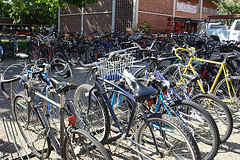11 Ways to Be a Green Student
You don’t have to own a hybrid or live on organic food to be a green student. Going green is all about making small changes in your life that will benefit both you and the environment. And this can be done by reducing your carbon footprint.
Your carbon footprint is the total amount of greenhouse gases that are produced by all of your everyday activities, and it is measured in units of carbon dioxide. Your activities can include everything from driving a car to brushing your teeth, so just by reducing the amount of greenhouse gas-producing activities you do every day, you can help preserve the environment.
So what can you do as a college student to be more green and eco-conscious? Here are 11 steps you can take:

Photo by Velcr0
- Wash, Don’t Throw: It’s always a good idea to keep some form of kitchenware in your room. Get a few bowls, plates, cups and utensils that you can rewash after they’re used. That way you won’t accumulate trash with paper products, and you’ll save money by not having to buy dishes as often. You can also find dishware, silverware and cup recommendations here.
- Reuse Your Water Bottle: One important reusable product you should buy is a water bottle. The We Add Up Water Bottle is made from recycled plastic, which is double the eco-friendliness, however, there is a lot of contraversy about the safety of plastic water bottles, so you might want to consider a stainless steel one instead.
- Walk or Ride a Bike: If you live on campus or close enough to it, the best thing for you to do would be to walk or ride a bike. You’ll get exercise, save money on fuel and even reduce your carbon dioxide emissions. If you’re interested in purchasing a cool bike, check out my blog post on the Puma Glow Rider. This bike actually glows in the dark, which is great for late classes or long nights studying at the library.
- Strip Down to the Basics: I know that in college I couldn’t live without my computer, stereo, television and other random electronic devices. I had to bring at least two power strips so everything had its own plug. What I didn’t know is that power strips still use energy even when the items plugged into them are off. One thing you can do to conserve energy is to unplug your power strip or any other electronic devices whenever they’re not being used. You can think of it as an added fire safety precaution as well!
- Cool It Down: Most dorm buildings do not have air conditioning systems in them because many were built before AC even existed! You might be lucky enough to have an AC unit in your window, or you might befall the fate I had and get stuck with only the slight breeze from an open window to cool you down. If you do have AC you should never keep it on all the time. Turn it on long enough to cool down your room and then shut it off when you sleep. For those students without AC, opt for an energy-saving fan or open windows. You can also spend more time outside studying and enjoying the fresh air.
- Dress Green: One of the best green clothing products to wear is organic cotton. You can get almost every article of clothing in organic cotton, including t-shirts, pants and socks. Organic cotton is grown using environmentally-friendly methods and contains no harsh chemicals or pesticides. The Organic Trade Association lists some great facts about it here. Some cool products that I have discovered that are made from organic cotton are Tees for Change
 , Teko Socks
, Teko Socks and the Body Glove Castaway Sandal
and the Body Glove Castaway Sandal . Unplugged Label
. Unplugged Label also makes some trendy clothes that are really affordable and don’t forget that bamboo and hemp are other green materials that can help you dress for eco-success.
also makes some trendy clothes that are really affordable and don’t forget that bamboo and hemp are other green materials that can help you dress for eco-success. - The Right Light Way: You’ll most likely bring a desk or standing lamp to help illuminate your new room. Many of the lamps use halogen light bulbs, and these generate hundreds of watts of electricity. The best type of light bulb to get is a compact fluorescent bulb (CFL), which is just as bright, lasts extra long and reduces energy consumption by 75%! You can see an array of CFL bulbs here.
- Recycle: Pretty much everything that a college student overuses can be recycled, from soda cans and fast food bags to printer paper and ink cartridges. That’s why it’s important for you to recycle as much as you can. If your campus has recycling stations, use them. If they don’t, then how about starting your own recycling program? If you’re not sure how to do this, check out Green Student U’s How to Start a Recycling Program page for helpful tips.
- Buy a Tune, Plant a Tree: I don’t know of any student who doesn’t own an iPod, because let’s face it: music is a big part of any college campus. Music helps students get through their schoolwork, and it helps them relax after a long week of classes. So if you happen to purchase iTunes on a weekly basis, why not also plant a tree and offset some carbon dioxide emissions at the same time? Tunes for Trees is a great website where you can purchase iTunes, and for every 10 songs that you buy, a tree is planted in your name.
- Buy Used Textbooks: But one way you can be green and save some green is to buy used textbooks. Recycling old textbooks is a great way to keep publishers from cutting down more trees to produce new textbooks, and it saves you a lot of money. Besides going to your college bookstore, you can also find a lot of textbooks online. Read this post to find out how.
- Computer Conservation: It is estimated that people waste over $1 billion in electricity every year just in computer use, and many of those people are students! To help conserve energy for your computer you can: Invest in an energy-saving computer, monitor and printer (look for the Energy Star label), turn off your computer whenever you’re not using it, and set it to sleep mode when you are away for short periods of time
Reducing your carbon footprint doesn’t take too much effort, so if you just incorporate the above steps into your daily routine you can easily become a green student.
About the Author:
Trish Smith is a copywriter for Green Student U, a blog-style site that introduces today’s students to a wide variety of global environmental issues by recognizing college campus green initiatives and personal success stories, as well as how the world is being shaped by environmental reform.
Thanks for visiting. If you're new here, you may want to subscribe to our RSS feed.








August 20th, 2008 at 10:48 pm
Silly idiots, carbon is good for the world. “Carbon footprint” means YOU. YOUR the problem, YOUR to be limited. In other words, “Carbon Footprint” = a human and therefore humans are bad and need to be limited, and eliminated.
August 21st, 2008 at 10:48 pm
Actually CalFord, carbon is good for the world - but only in moderation. Humans aren’t the problem, human over-consumption and over-development is the problem. Humans existed for thousands of years before we had a “carbon footprint” problem. It was not until the Industrial Revolution that our footprint began to be more than the earth could handle. So if you think humans need to be limited and eliminated, I think you are mistaken.
August 22nd, 2008 at 2:02 am
I think YOU think this, at least via the people who really think it. In other words your emulating propaganda that is anti-life. A single major volcanic explosion creates more CO2, Sulfur, and many other gases then all of humanity combined over all the time line of humans. Imagine 50 million years ago when it was common to have dozens of major eruptions. The facts given to you simple are not accurate and your not yet mature enough to realize that. But your energy is sincere, I do see that.
August 28th, 2008 at 3:48 pm
Calford you’re hypocrit.
You’re not yet mature enough to use proper grammar.
December 31st, 2008 at 6:39 am
I would sugest using the website GreenTextbooks.org
Save Money, Save The Planet
GreenTextbooks.org specializes in the recycling of textbooks, DVDs, CDs. Buying used textbooks not only saves you money, but cuts down on greenhouse gases caused by the manufacturing of new textbooks.
With GreenTextbooks.org you’re not only saving trees, you are saving some green.
http://www.greentextbooks.org
January 7th, 2010 at 12:32 pm
You made some good points there.
January 20th, 2010 at 8:52 pm
I agree, particularly with the point of recycling. Now staring your own recycling program is an interesting aspect. Btw, many supermarkets, groceries and the like have recycling centers where you can bring your used plastic bags, shopping bags, return your bottles and the like.